8 Excellent Examples of Customer Relationship Management
- September 18, 2019
- 18 mins read
- Listen

Maintaining strong relationships with customers is paramount for sustainable growth and success. Customer Relationship Management (CRM) has evolved from a mere database management tool to a strategic imperative for businesses. With the right CRM tools and strategies in place, businesses can not only streamline their operations but also enhance customer satisfaction, retention, and loyalty.
92% of businesses say CRM software plays an important role in achieving their revenue goals.
Are you looking to establish your presence or a seasoned enterprise aiming to optimize your CRM processes? In this blog, let’s explore the customer relationship management examples, types, and top tools to elevate your customer relationship management efforts.
What is Customer Relationship Management?
Customer relationship management refers to the art of managing good customer relationships and prospective customers. It is all about understanding who your customers and potential customers are, and nurturing the relationships you have with them. It is about identifying client expectations and how you meet or go beyond their expectations.
A customer relationship model seeks to improve the relationship between a business and the customer. For this, they drive new trends and provide profits for current and future operations and investments.
The below model is one approach to implementing CRM.
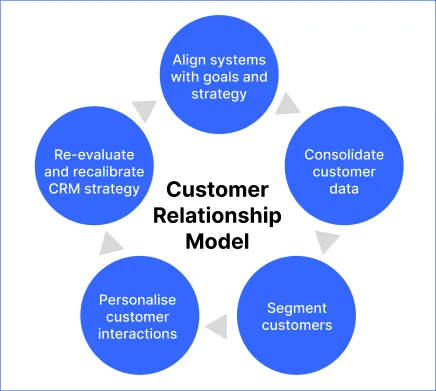
The customer relationship management model can be further categorized into the following stages
- Awareness – It is the first touchpoint where prospects try to know more about your brand as a whole.
- Discovery – Then you learn and identify the needs of the prospects and share information to fulfill their requirements.
- Evaluation – Moving ahead, the prospects compare and evaluate your products/services with your competitors.
- Intent – Finally, your prospect is convinced and made a decision to buy from you.
- Purchase – After making the payment, the deal is done and the prospect converts into your customer.
- Loyalty – Make a follow-up after purchase to determine customer success with your product and ask for referrals.
Types of CRM Systems
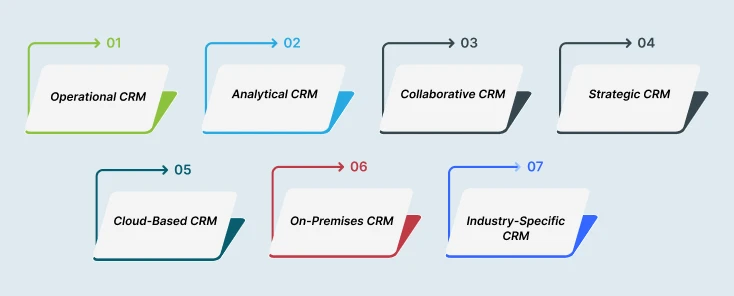
CRM systems can be broadly categorized into several types based on their functionality and deployment model. Here are some common types of CRM systems:
- Operational CRM: It mainly focuses on automating and improving customer-facing processes such as sales, marketing, and customer service. The operational CRM typically includes features like contact management, sales force automation, lead management, campaign management, and customer service/support.
- Analytical CRM: This type involves analyzing customer data to gain insights into customer behavior, preferences, and trends. It utilizes data mining, predictive analytics, and business intelligence tools to identify patterns and make data-driven decisions. Analytical CRM helps businesses understand their customers better, segment their customer base, and personalize marketing campaigns and offerings to improve customer satisfaction and retention.
- Collaborative CRM: It focuses on facilitating communication and collaboration between different departments within an organization to better serve customers. It integrates various communication channels such as email, phone, chat, and social media to ensure consistent and coordinated interactions with customers across departments. This type of CRM system helps break down silos and improve cross-functional collaboration.
- Strategic CRM: It involves long-term planning and relationship-building strategies aimed at maximizing customer lifetime value and profitability. It focuses on developing and nurturing profitable customer relationships through personalized engagement, loyalty programs, and customer retention initiatives. Strategic CRM aligns organizational goals with customer needs and objectives to create sustainable competitive advantages.
- Cloud-Based CRM: They are hosted on remote servers and accessed via the internet, offering scalability, flexibility, and accessibility from any device with an internet connection. They eliminate the need for on-premises hardware and software installation and maintenance, making them cost-effective and easy to deploy.
- On-Premises CRM: These are installed and maintained on the company’s own servers and infrastructure. They provide complete control over data security and customization. They require upfront investment in hardware, software licenses, and IT infrastructure but offer greater customization and integration capabilities.
- Industry-Specific CRM: Some CRM systems are designed to meet the unique needs and requirements of specific industries such as healthcare, finance, real estate, or retail. These industry-specific CRM solutions offer tailored features, workflows, and integrations to address industry-specific challenges and compliance regulations effectively. They help businesses in specialized sectors streamline operations, improve customer relationships, and achieve industry-specific objectives.
Impact of Customer Relationship Management on Your Business
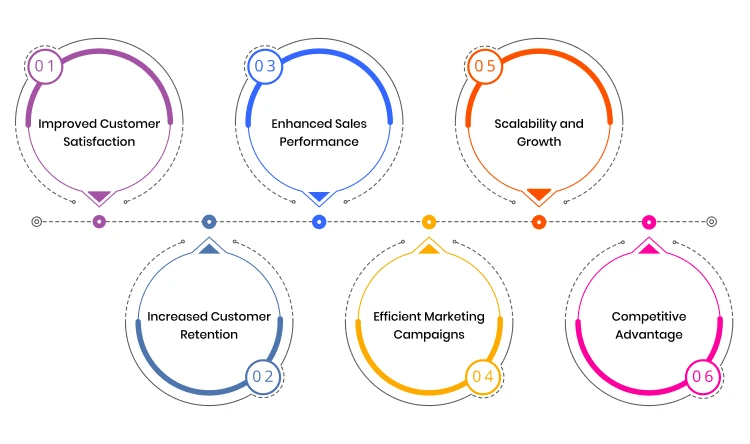
Customer Relationship Management (CRM) has a profound impact on businesses across various industries. Here are some key ways in which CRM can influence your business:
- Improved Customer Satisfaction: CRM systems enable businesses to understand their customers better, track interactions, and personalize communication. Businesses can enhance customer satisfaction by providing better service and addressing customer needs more effectively.
- Increased Customer Retention: Businesses can tailor their offerings and communication to individual customers by maintaining a comprehensive database of customer information and preferences. This personalized approach fosters loyalty and increases the likelihood of repeat purchases. Thereby, improving customer retention rates.
- Enhanced Sales Performance: It streamlines the sales process by providing insights into customer behavior, identifying potential leads, and tracking sales opportunities. Sales teams can prioritize their efforts more effectively and focus on high-value prospects.
- Efficient Marketing Campaigns: CRM software enables businesses to segment their customer base and target specific demographics with personalized marketing campaigns. Businesses can refine their marketing strategies and improve the ROI of their marketing efforts by analyzing customer data and tracking campaign performance.
- Scalability and Growth: As businesses grow, managing customer relationships becomes increasingly complex. CRM systems provide scalable solutions that can accommodate growing customer bases and evolving business needs. It facilitates business growth and expansion by standardizing processes and automating routine tasks.
- Competitive Advantage: These days, providing exceptional customer service and building strong relationships with customers is essential for maintaining a competitive edge. CRM enables businesses to differentiate themselves by delivering personalized experiences and exceeding customer expectations.
How Does Creating Good Customer Relationship Management (CRM) Foundation Matter?
Customers are the heartbeat of all businesses. Therefore, creating good customer engagement examples by strengthening relationships with clients is crucial for business success. Through good and bad times, maintaining a healthy customer relationship with all your customers will help in sustaining the performance of your business.
Whether it is online event companies or trade events, this reason is making/forcing businesses to develop excellent customer relationships for maintaining good performance. Developing good CRM and marketing helps your business to set better customer relationship management examples.
Let’s talk about the key areas of developing good customer relationship management
- Results in good customer experience – CRM is about creating relationships with your customers so that they enjoy positive experiences when interacting with your brand.
- Growth in customer retention rates – Positive experiences fuel customer retention. Your customers are loyal to your brand and turn into brand advocates.
- High level of customer satisfaction – When you meet your customer expectations with your exceptional service, it boosts satisfaction level and they are likely to return to your business again.
So, now let us find out how businesses have used innovative customer relationship management and marketing models/strategies.
8 Examples of Innovative Marketing & Customer Relationship Management
To improve customer relationships, you need to focus on each and every interaction made by customers with your brand. Here are some of the best customer relationship management examples that delve into important customer interactions.
1. Deliver Live Assistance to Boost Customer Engagement
Aberdeen Group’s study found that businesses using visual engagement tools marked an 83% year-on-year increase in annual revenue and achieved 2.7x greater annual improvement (decrease) in customer effort score.
Live assistance is gaining ground as a prominent communication channel for banks as it makes interaction easier. It helps to wrap up a large part of the customer journey context and boost customer satisfaction.
Instead of waiting for bank visits to carry out key transactions like applying for a loan, by using visual tools like video chat and co-browsing, customers gain faster, as well as in-person engagement. Live engagement platforms offer face-to-face video chat assistance that assures security to customers for handling their finances via direct conversation remotely.
The co-browsing solution greatly impacts online customer support by empowering your agents to converse over the customer’s browser and assist to the right page or fill out forms.
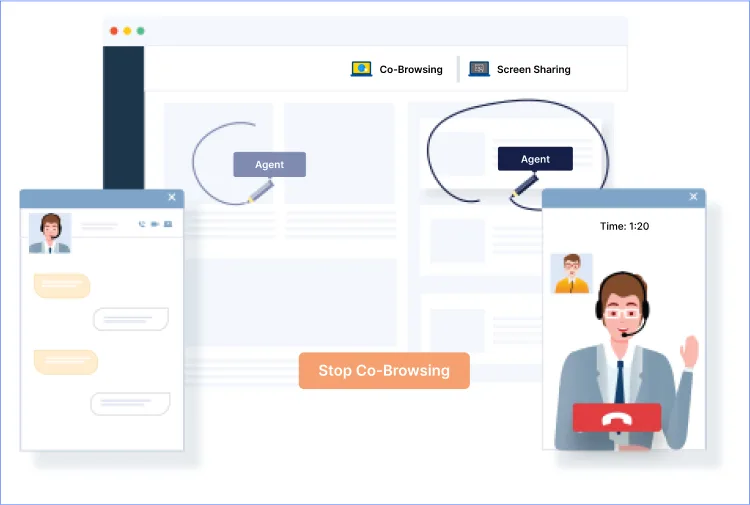
Benefits of virtual banking with live assistance tools
- Combining video chat and co-browsing allows the agents to deliver a personalized banking experience.
- Agents can serve customers for the first time, reducing the number of contacts required for assistance.
- Using live collaboration tools for banking support boosts customer trust and satisfaction.
Commercial Bank of Kuwait (CBK), the leading bank, has implemented REVE Chat’s video and co-browsing solution to deliver live assistance to its customers. With live tools, the bank has witnessed a significant increase in customer engagement.
Sign Up with REVE Chat and offer personalized customer service by directly interacting with them and learning the root of the issue.
Takeaways
- If your customer touchpoints require live support, engage them with one video chat or co-browsing solution.
- You should identify your customer journey and provide live assistance for better resolution and customer service experience.
2. Have an Omnichannel Presence
As technology has evolved, the number of communication channels has also grown exponentially. Businesses now have multiple marketing and customer service channels to communicate with their customers, including both offline and online methods.
Having more communication channels is a good thing for a business as it gives the ability to interact with customers, and serve them. With omnichannel support, you can integrate text, instant messaging, and social to deliver a unified brand experience so that customers can switch between multiple channels and still experience consistent service.
Oasis, one of the leading women’s clothing brands, focuses on delivering the best omni-channel experience to its customers. It presents one of the finest customer obsession examples by ensuring value at each stage of the journey.
It focused on three main areas to give a better experience to its customers
- Identified the most preferred channels for customer touchpoints
- Developed a strategy to engage and support them across all those touchpoints
- Delivered a consistent experience throughout the customer journey
As it identified that maximum touchpoints were made via social platforms, it thought of doing something different to impress its Instagram followers.

It created a special gallery of user-generated Instagram content, substantially encouraging customers to model the clothes they have bought from the Oasis store.
Takeaways:
- Know your customer’s preferred channels to reach your business and be available for real-time support.
- Improve your customer relationships by delivering a consistent multi-channel support experience.
3. Automate Customer Support
Delayed response is one of the top reasons why customers decline and leave you at risk of your competitors. Nothing makes a customer happy and satisfied than a faster response.
Ubisend study says, 21% of consumers believe chatbots are the easiest way to contact a business.
Automating customer support with the best chatbots can redefine your customer satisfaction rates by improving your response times, engagement, and your customers’ interests. Real-time service is invaluable in retaining your current relationships and prospects as well.
Chatbots also help businesses to
- Direct customers to genuine answers that reduce the number of support tickets raised by customers.
- Feed your bot with general FAQs and train it with relevant answers so that it follows the same pattern to serve customers in the future.
Hipmunk is a famous travel platform used to search for travel deals. It attempted to use AI technology to engage customers at a closer level and created Hello chatbot

How does the Hello chatbot help customers?
- To search and reserve the travel activity of their choice.
- The chatbot determines the location of the customer, and then aggregates and promotes discounts/deals on travel packages.
- It can be integrated with various chat applications like Facebook, and Skype.
Some takeaways for you:
- You can place chatbots for initiating a chat, and collect basic information from website visitors & customers, and engage them.
- You can engage your customers 24×7 when the support team is not available. It reduces the number of support requests and boosts customer satisfaction.
4. Continuous Marketing Engagement
Lack of engagement is one of the big red flags for customer churn in your business. The trick to avoiding this problem is to keep them happy and engaged in post-sales. Because loyal customers are far more profitable than new customers.
How do you do that?
It can be a daunting task to maintain continuous engagement with your customers to offer support to foster this crucial business relationship.
But the thumb rule is: the better the engagement, the happier your customers are. When customers are engaged correctly, they are more likely to retain, recommend, and buy more. If your customer engagement strategies are effective, they will positively impact your KPIs.
Here are some strategies to improve continuous marketing engagement:
- Send a thank you email as a token of appreciation and connect with them with a positive impression. And the basis of creating customer relationships is connecting with people.
- Ask for reviews to measure your customer success with your products and services. You can encourage customers to provide reviews, and you can entice them with a discount or special deal, like free shipping on their next order.
- Cross-sell or upsell your products through post-purchase emails. Notify your customers of your new products and also offer product recommendations based on their previous purchases.
- Reward systems can be one of the most effective customer loyalty program ideas to engage customers after they have made their purchase.
- Request for referrals is an effective form of marketing. People tend to make a purchase for sure when it is recommended by a friend or family. The best time to request a referral is after the sale is closed.
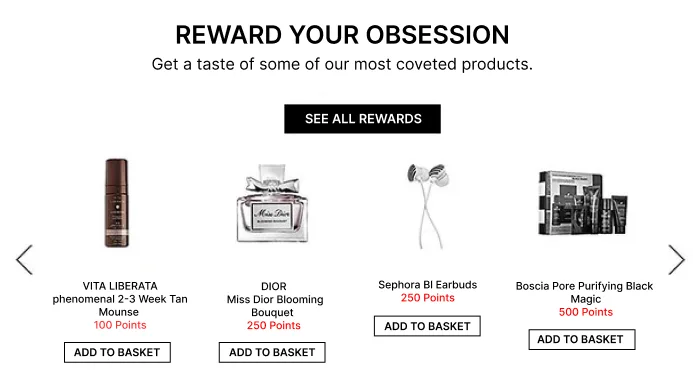
Sephora’s Beauty Insider rewards program is globally popular.
- The program records more than 17 million loyal members, and members make up as much as 80% of Sephora’s annual sales.
- Customers earn rewards for each purchase based on a traditional point system.
- The best part is that members can choose how to use their reward points.
Takeaways:
- You are supposed to keep your customers engaged after the sale. It should not be only part of the customer journey.
- When you engage your customers post-sales, they feel valued, and this improves customer retention
5. Use Social Media for Customer Service
Social media has emerged as a crucial touchpoint in structuring customer relationships. Customers share their positive as well as negative reviews and experiences over social media and expect an immediate response.
According to Gartner, churn increases by up to 15% for businesses that fail to respond to messages on social media.
Popular social channels like Instagram, Facebook, LinkedIn, and Twitter are not just for business promotion. They can be used to connect with your customers. Almost 78% of customers want brands to help people connect through social media.
Framing good customer relationships on social media helps businesses to improve relationships with customers by making them feel connected to your brand.
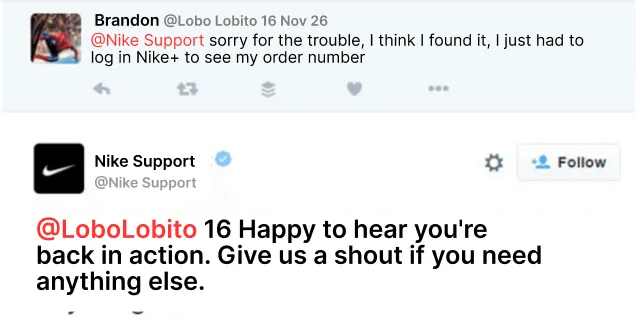
Make your customers feel happy after interacting with you. It helps in creating strong connections with customers over social media. For instance, Nike engages its customers and makes them feel they are available to fix their issues even though customers can find the solution themselves.
Takeaways:
- You should respond faster to social reviews and posts and develop customer trust.
- It is recommended to personalize your conversations while talking directly with customers.
- Offer rewards to your customers with campaigns and contests to set good customer relationship management examples.
6. Improve Your Conversion Rates
Your customers are your greatest assets as they are the ones who will vouch for the quality of your products and services. If you play your cards right when it comes to customer experience, your customers can turn into your marketing representatives.
And how having customers as marketing professionals is effective?
If customers are satisfied with your service, they turn to their friends and family for recommendations. They share their success stories with your brand with positive word of mouth.
Referrals convert at 3-5 times a higher rate than other marketing methods. The referred customers are more loyal and have higher lifetime values.
Casper Mattress company came with an irresistible offer. It offered to take a mattress home and sleep on it for 100 days before deciding whether to return it. Such an amazing offer along with quick online ordering and home delivery – nobody wanted to miss it.

- Giving a long trial period eliminated the greatest fears about buying a high-end mattress. Customers had plenty of time to test the mattress for comfort and durability.
- Customers had mattresses in their homes that they could use and show to others. Casper at the same time circulated detailed ads and reviews on social media.
Takeaway:
- You should focus on your customer service strategies. When your customers are satisfied, they retain your business and advocate your brand with positive word of mouth.
7. Increase Customer Satisfaction
Forrester’s research indicates that expectations toward customer service are related to three main factors: the success of the solving process, ease of the solving process, and emotions during the solving process.
The journey of providing your customers with a positive experience starts from the moment they visit your website and extends beyond the moment they become your customers.
Keeping your customer’s expectations a top priority and going the extra mile to meet those expectations will boost their satisfaction and set great customer delight examples.
A customer’s experience and feedback should be the factors that validate important decisions within your business. Seeking customers’ feedback and implementing it makes the customers feel better.
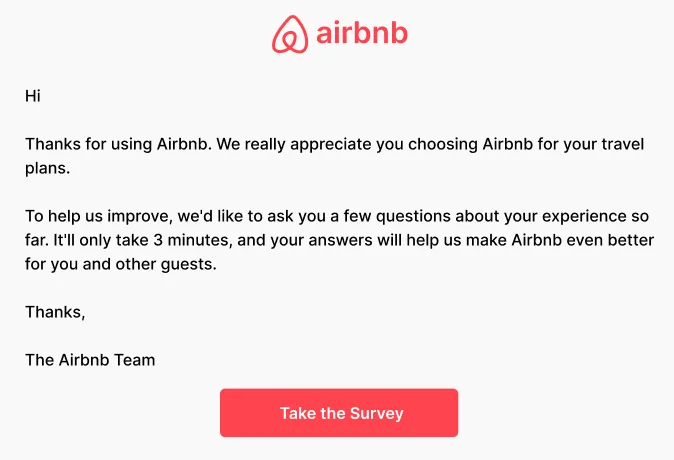
Airbnb surveys take customers’ opinions after their stay, giving them the space to decide whether they want to share their feedback or not. Airbnb has increased the number of bookings by 25%, just with their referral program.
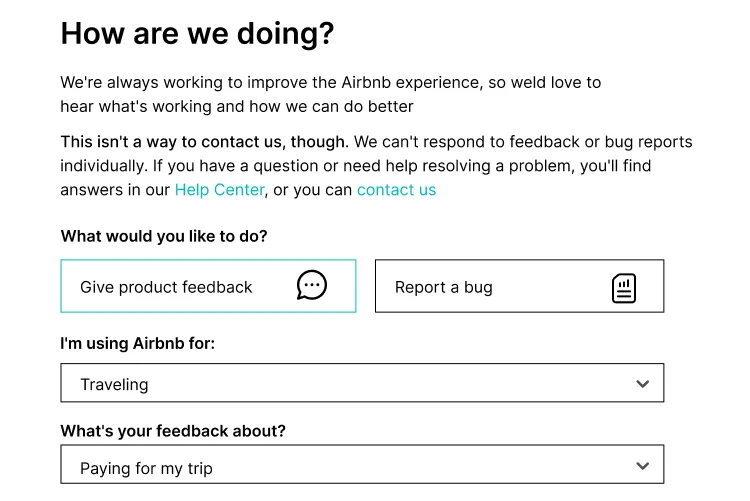
Takeaway:
- You should learn about your customer experiences and try to fulfill them to deliver a positive experience. Positive experiences boost customer satisfaction.
8. Develop a Strong Brand Image
Every business puts its best efforts into developing a strong brand image as it sets the foundation for building relationships with customers. A strong brand image impacts increasing the trust level in customers and helps in customer retention.
Successful branding leads to increased customer loyalty, an improved image, and a relatable identity. TSL Marketing
The brand image can be strengthened by making use of brand communication through word of mouth.
Colgate, for example, is a popular brand name. It has built an image in customers that it is the best product for maintaining their dental health. Usually, customers go for Colgate as a brand as they are strongly connected with it.
Takeaway:
- Brand image is of great importance. Put your best efforts to develop your brand image and maintain the trust of your customers.
Top 5 Tools for Better Customer Relationship Management
There are numerous tools available for customer relationship management (CRM), each offering various features to help businesses effectively manage their interactions with customers. Here are some of the top tools commonly used for better CRM:
- REVE Chat: REVE Chat is an advanced and feature-rich omni-channel customer relationship management platform developed to help businesses convert and serve. It can help a business engage customers with top-class engagement tools.
- Salesforce: Salesforce is one of the leading CRM platforms, offering a comprehensive suite of tools for sales, marketing, and customer service. It provides features such as contact management, opportunity tracking, lead scoring, email automation, and customizable dashboards. It also offers extensive integration capabilities with third-party apps and a vibrant ecosystem of add-ons and extensions.
- HubSpot CRM: It is a popular choice for small to mid-sized businesses. It offers a user-friendly interface and a range of features for sales, marketing, and customer service. HubSpot includes contact management, email tracking, deal tracking, lead scoring, and reporting tools.
- Zoho CRM: It is a robust CRM solution suitable for businesses of all sizes, offering features like lead management, pipeline management, email marketing, workflow automation, and reporting/analytics. It provides integration with other Zoho products as well as third-party applications.
- Microsoft Dynamics 365: It is a cloud-based CRM and ERP platform that integrates seamlessly with other Microsoft products such as Office 365 and Outlook. It offers features for sales, marketing, customer service, and field service, along with AI-driven insights and predictive analytics. It helps businesses make informed decisions and personalize customer interactions.
- Pipedrive: This CRM platform is designed to help sales teams manage leads, track deals, and improve sales performance. It offers customizable pipelines, activity tracking, email integration, and reporting tools.
Conclusion
Customer relationship management is an integral part of every section of the business. It is not limited to customer support only, rather it applies to the whole customer life cycle across their journey.
Developing long-lasting customer relationships is crucial for businesses as it helps your brand stand out and gives customers reasons to emotionally connect with you. However, having a strong foundation of customer relationships is the base of every business.
Businesses are different but the core essence of success will always remain the same. REVE Chat’s live chat platform allows you to understand and address customer concerns in real time, which strengthens customer relationships. Sign up today to set an excellent customer relationship management example.
Frequently Asked Questions
Automating your customer support is a great example of customer relationship management as you are improving your customer service to better serve your consumers.
Adopting a tool for omnichannel capabilities is a good CRM strategy as you reach out to customers in their preferred channels, providing great service and improving customer satisfaction.
There are seven types of CRMs and they are: Operational CRM, Analytical CRM, Collaborative CRM, Strategic CRM, Cloud-Based CRM, On-Premises CRM, and Industry Specific CRM.
By using CRM and Customer Service tools like Salesforce or REVE Chat, you can provide customers with the best support possible. Thus, improving your relationship with customers.




